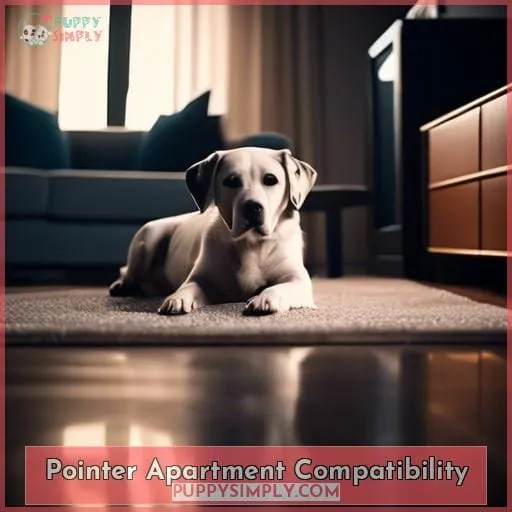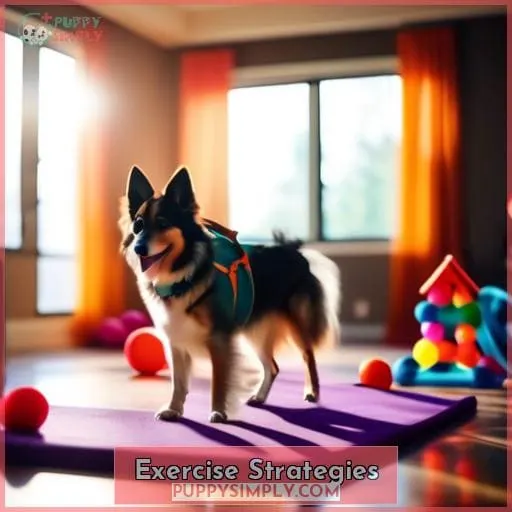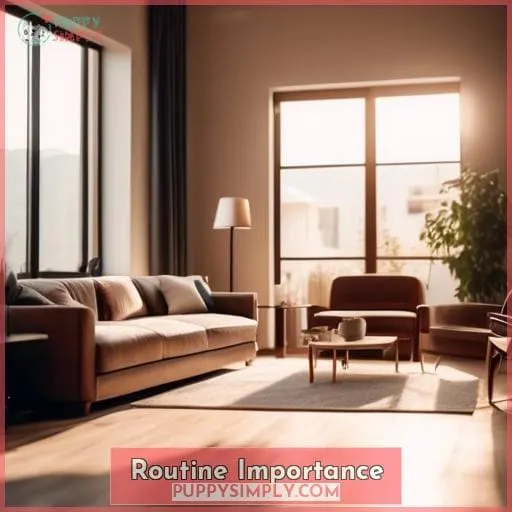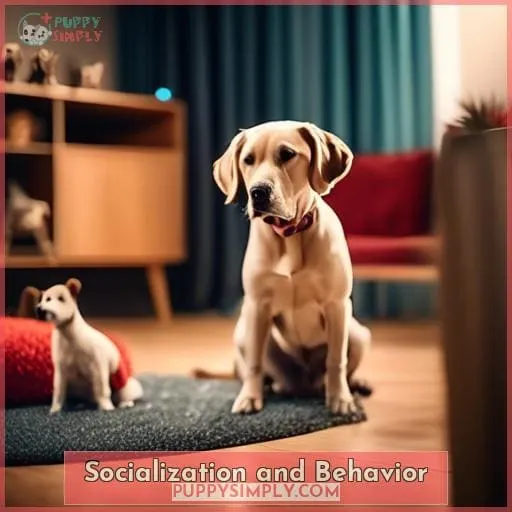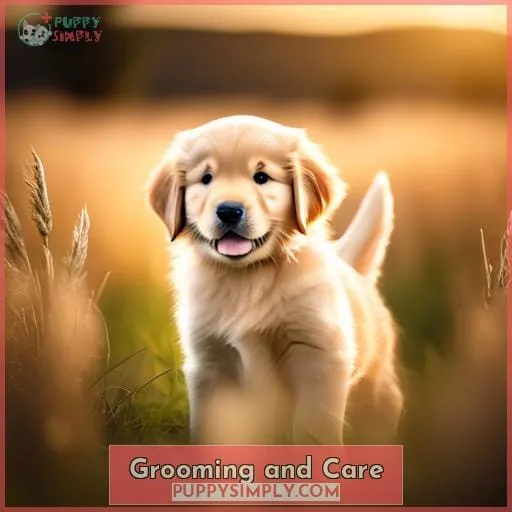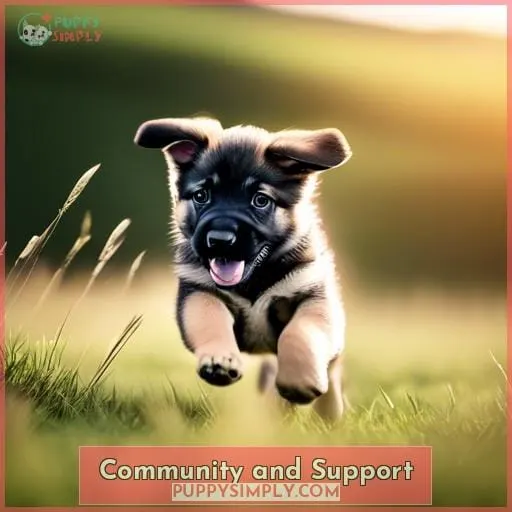This site is supported by our readers. We may earn a commission, at no cost to you, if you purchase through links.
 You and your pointer crave adventure together.
You and your pointer crave adventure together.
But living in an apartment makes exercising your energetic pup difficult.
We’ll explore smart strategies to keep your pointer engaged and thriving indoors.
With some creativity, you can enjoy quality time together no matter the space.
Just 75 words empower you to enrich your furry friend’s life.
Our tips ensure your happy pointer gets the stimulation he needs.
Table Of Contents
- Key Takeaways
- Pointer Apartment Compatibility
- Choosing the Right Pointer
- Apartment Living Challenges
- Exercise Strategies
- Mental Stimulation
- Routine Importance
- Socialization and Behavior
- Health and Wellness
- Grooming and Care
- Community and Support
- Frequently Asked Questions (FAQs)
- How do I handle my pointer’s separation anxiety while living in an apartment?
- What are the best ways to keep my pointer entertained and mentally stimulated within the limited space of an apartment?
- What are some tips for socializing my pointer with other dogs and people in an apartment building?
- Are there any specific health concerns I should be aware of for pointers living in apartments, and how can I prevent them?
- How can I find a community of pointer owners or enthusiasts in my area, especially considering the limited space of an apartment?
- Conclusion
Key Takeaways
- Consider the demanding exercise requirements of pointers and ensure you can provide adequate activity in an apartment setting.
- Choose a pointer with a moderate energy level and gentle temperament to suit apartment living.
- Address challenges such as limited space, noise issues, and health concerns with creative solutions and proper care.
- Maintain a healthy lifestyle for your pointer through regular exercise, proper nutrition, and veterinary care.
Pointer Apartment Compatibility
When considering a pointer for an apartment, you’ll need to factor in their high energy level and exercise requirements.
These medium to large hunting dogs are bred to be very active and need 1-2 hours of exercise daily.
Providing adequate activity for a pointer in an apartment setting takes commitment, but is doable with effort.
Size and Activity Level
With their medium-to-large build and high energy, you’ll need to factor in a Pointer’s size and activity level when assessing apartment compatibility.
As an active breed requiring daily exercise, consider:
- Their footprint – Pointers need adequate room to move and stretch out.
- Your apartment layout – Can you create open spaces for playtime?
- Nearby parks – Are there places to walk and run off-leash?
- Your commitment – Can you provide sufficient physical and mental activity?
Thoughtful preparation and lifestyle adjustments enable happy Pointer pups to thrive in apartments.
Exercise Requirements
You’ll need to provide adequate exercise for your energetic pointer in an apartment setting.
Despite having limited space, it’s essential to meet their need for vigorous daily activity with creative solutions:
- Use indoor flirt poles.
- Go up and down stairs.
- Take advantage of any small open spaces to play fetch.
Getting them out for daily walks, jogs, or trips to the dog park are also great ways to burn off their high energy.
The key is keeping their active minds and bodies engaged within an apartment’s confined area.
Choosing the Right Pointer
You’ll want to consider your pointer’s natural energy levels and temperament.
An extremely high-energy dog may struggle in a smaller living space, while a more laidback pointer will likely adapt better.
Look for a pup with a more relaxed temperament if having a happy apartment pointer is your goal.
Energy Levels
Your consideration of a Pointer’s energy requirements helps ensure an appropriate match for apartment life.
While Pointers are active, they can thrive in apartments if you provide outlets for their physical and mental energy.
Seek a Pointer with moderate energy levels, as they’re more adaptable to apartment living.
Temperament
Considering your apartment lifestyle, selecting a Pointer with a temperament that complements your routine is essential.
Look for a Pointer who’s adaptable, easy to train, and has a calm and gentle demeanor.
You’ll also want to consider their energy level and how well they’ll fit into your family dynamic.
- Adaptability: Pointers are highly adaptable dogs who can thrive in various environments, including apartments.
- Trainability: Pointers are intelligent and eager to please, making them responsive to training techniques.
- Temperament: Pointers are typically friendly and affectionate dogs who make great family companions.
Apartment Living Challenges
In apartment living, space is often limited, which can be challenging for active pointers who need room to move.
Plus, you may encounter noise issues if your pointer barks a lot, which can disturb neighbors in close quarters.
Space Limitations
One challenge you’ll face is that apartments are often smaller than houses, meaning less room for your Pointer to run and play.
To overcome this, consider creative solutions:
- Use vertical space with catwalks and shelves.
- Outdoor excursions to parks and dog-friendly areas.
- Multi-functional furniture like a couch with a built-in dog bed.
| Limited Mobility | Creative Solutions |
|---|---|
| Not enough room to run | Use vertical space with catwalks and shelves |
| No yard for exercise | Outdoor excursions to parks and dog-friendly areas |
| Small living room | Multi-functional furniture like a couch with a built-in dog bed |
Noise Considerations
Apartment living can also present challenges regarding noise, as Pointers’ natural instincts to bark and alert you to potential threats may disturb neighbors in close proximity.
Mitigating this involves:
- Reducing outside noises
- Exploring soundproofing solutions
- Implementing training desensitization
Establishing quiet time techniques can also help your Pointer adjust to apartment living.
With patience and consistency, you can train your hunting dog to be a quiet and considerate apartment resident, ensuring harmonious coexistence with your neighbors.
Exercise Strategies
To make your pointer happy and healthy in an apartment, you’ll need to:
- Engage them in indoor activities and provide opportunities for them to burn energy outdoors.
- Set up an indoor agility course, play fetch or chase games, or teach your pointer tricks.
When you venture outside:
- Seek out nearby parks or open spaces where your dog can run freely and socialize with other dogs.
Indoor Activities
With ample indoor activities, your Pointer can get the exercise it needs even in limited spaces.
Interactive toys like puzzle feeders and treat balls provide mental engagement and stimulation.
Hide-and-seek games test their hunting instincts and keep them active.
Indoor agility courses challenge their physical and mental abilities.
Regular training sessions reinforce good behavior and provide mental enrichment.
These activities strengthen your bond, prevent boredom, and curb destructive behaviors.
Nearby Parks and Outdoors
Explore local parks and outdoor areas to unleash your pointer’s boundless energy.
Discover canine adventures in fenced dog parks, where your furry friend can run, chase, and socialize with fellow canines.
Embark on nature walks through scenic trails, allowing your pointer to sniff and explore the wonders of the natural world.
Organize park playdates with fellow dog owners, creating a supportive community for both you and your beloved companion.
Mental Stimulation
Mental stimulation is also key for your pointer’s well-being.
Interactive toys, training games, and puzzle feeders can help keep your dog entertained and engaged, even when you’re not home.
Rotate toys regularly to maintain your pointer’s interest.
Interactive Toys
To keep your Pointer mentally stimulated, you can provide them with interactive toys that challenge their intellect and encourage problem-solving.
Engage their natural curiosity with puzzle games that reward them with treats, or use treat dispensers that require them to work for their snack.
Hide & seek games using toys or treats around your apartment can also provide both mental and physical stimulation.
Training Games
Besides interactive toys, training games can also fulfill your Pointer’s need for mental stimulation.
Engage your pup in obedience challenges that reinforce good behavior and strengthen your bond.
Try distraction training to enhance focus and mental agility.
Use positive reinforcement techniques to reward desired behaviors and create a harmonious living environment.
Routine Importance
Pointers thrive on routine, so having a consistent schedule with regular mealtimes, walks, and playtime can help them feel settled and secure in an apartment setting.
This routine can also help prevent boredom and destructive behaviors, making apartment living more enjoyable for both you and your pointer.
Daily Schedules
A consistent daily schedule helps your Pointer thrive in an apartment by providing structure and predictability.
Feeding routines, bathroom breaks, playtime schedule, rest periods, and training sessions should all have designated times.
This routine gives your dog a sense of security and helps them adjust to apartment living.
It also makes it easier for you to manage your time and responsibilities.
Consistency
Frequently sticking to a consistent routine will help your Pointer adjust to apartment living and feel secure in their new environment.
Consistency is the key to establishing positive behavioral patterns and maximizing training effectiveness.
Adhering to a regular schedule for meals, walks, playtime, and bedtime instills a sense of routine, providing mental discipline and stability for your canine companion.
This consistency in routine benefits both you and your Pointer, creating a harmonious and predictable living environment where everyone thrives.
Socialization and Behavior
It’s important to socialize your pointer puppy with other dogs to prevent them from becoming aggressive or fearful.
You’ll also need to manage their prey drive by:
- Keeping them on a leash when you’re outside
- Providing them with plenty of chew toys
Meeting Other Dogs
Socializing your pointer by meeting other dogs promotes friendly interactions and prevents isolation.
Take your pup to dog parks or organize pack playdates.
Teach canine communication cues like sit and stay to ensure respectful greetings.
Remember leash etiquette; keep your pointer on a leash until you’re certain they’ll behave.
These canine connections enrich your pointer’s life and make apartment living more enjoyable.
Managing Prey Drive
While socialization with other dogs is essential for your Pointer, you must also take steps to manage their strong prey drive to ensure harmonious interactions.
Use behavior modification techniques and positive reinforcement to redirect their attention away from potential prey.
Provide enrichment activities like interactive toys and controlled exposure to other animals to help them learn appropriate behavior.
Training techniques like obedience classes can also help curb their prey drive and promote good behavior in various situations.
Health and Wellness
Pointers are overall healthy, but you must be aware of common health issues such as:
- Hip dysplasia
- Cancer
- Gastric dilation-volvulus (GDV)
Regular checkups and early detection can help your pointer stay happy and healthy.
Veterinary Care
You’ll ensure your Pointer’s well-being in an apartment by:
- Taking them for regular veterinary checkups.
- Monitoring for common health issues.
Create a personalized vaccination schedule with your vet to protect your Pointer from preventable diseases.
Discuss proper diet and nutrition with your vet to:
- Maintain a healthy weight.
- Prevent obesity-related issues.
Keep a first-aid kit stocked with essential supplies for handling minor injuries or emergencies at home.
Establish a strong relationship with your vet for ongoing support and guidance in caring for your Pointer’s health.
Common Health Issues
Next, let’s address some common health problems you need to watch out for in your Pointer.
A balanced diet, preventative care, and exercise routines can help avert these issues.
Regular checkups are crucial for early detection and treatment.
With proper nutrition management and mental stimulation, you can help your Pointer stay healthy and happy in your apartment.
Grooming and Care
Pointers’ short, thick coats are easy to maintain with weekly brushing.
Keep their nails trimmed to prevent scratching and cracking, which can lead to infections.
Regular brushing and nail trims help keep your pointer healthy and comfortable in your apartment.
Coat Maintenance
Regular brushing is your ally in the war against tangles, mats, and unwanted fur tumbleweeds.
It’s a grooming routine that ensures your pointer pal’s coat stays healthy and tangle-free, preventing mats and reducing shedding.
Plus, it helps distribute natural oils for a shiny, lustrous coat that’s the envy of the dog park.
Nail Trimming
For meticulous nail care, use clippers designed for your Pointer’s breed and size.
Clip nails regularly to prevent overgrowth and discomfort.
If you’re new to nail trimming, consider seeking professional services to learn proper technique.
Keep your Pointer calm and comfortable during nail trims with positive reinforcement and treats.
For anxious Pointers, muzzle them or use a towel to wrap their snout for safety.
If nail trimming becomes a continuous struggle, consult a veterinarian or professional groomer for assistance.
Community and Support
To ensure a well-rounded life for your pointer in an apartment:
- Seek out a community of like-minded dog owners and professionals who can offer support and guidance.
- Engage with breed-specific forums, online communities, and local dog groups to connect with fellow pointer enthusiasts, exchange experiences, and gain valuable insights into caring for your furry friend in an apartment setting.
Explore training resources, attend local events, and participate in activities tailored for pointers:
- These platforms provide opportunities to socialize your dog, expose them to different environments, and reinforce their training.
- Remember, a stimulated and engaged pointer is a happy pointer!
Frequently Asked Questions (FAQs)
How do I handle my pointer’s separation anxiety while living in an apartment?
Ease your pointer’s separation anxiety by:
- Creating a cozy den in your apartment.
- Providing interactive toys.
- Gradually increasing alone time to build independence.
What are the best ways to keep my pointer entertained and mentally stimulated within the limited space of an apartment?
Unleash your pointer’s inner explorer with interactive puzzle toys, snuffle mats, and hidden treat games.
Engage their senses with scent work and agility challenges within your apartment’s cozy confines.
What are some tips for socializing my pointer with other dogs and people in an apartment building?
To foster socialization, frequent communal areas, like dog parks or building courtyards, with your pointer.
Encourage interaction with other dogs, and introduce yourself to neighbors, inviting them to share a walk or playtime.
Are there any specific health concerns I should be aware of for pointers living in apartments, and how can I prevent them?
Prevent health concerns for your pointer in an apartment by:
- Providing ample exercise.
- Maintaining a healthy diet.
- Scheduling regular vet checkups.
- Creating a stress-free environment.
How can I find a community of pointer owners or enthusiasts in my area, especially considering the limited space of an apartment?
Tap into online forums, social media groups, and local dog parks to connect with fellow pointer enthusiasts and owners in your area.
These communities foster a sense of belonging and provide valuable insights for apartment-living pointer owners.
Conclusion
You’ve got the keys to unlock a world of joy for your pointer in your apartment, even if it’s the size of a microchip.
With a dash of creativity, a sprinkle of patience, and a heap of love, you can transform your living space into a pointer paradise.
Pointers can thrive in apartments—it’s all about making smart choices, adapting your lifestyle, and providing them with the stimulation they crave.
Unleash the potential of your pointer, and together, you’ll conquer the concrete jungle, one wagging tail at a time.

